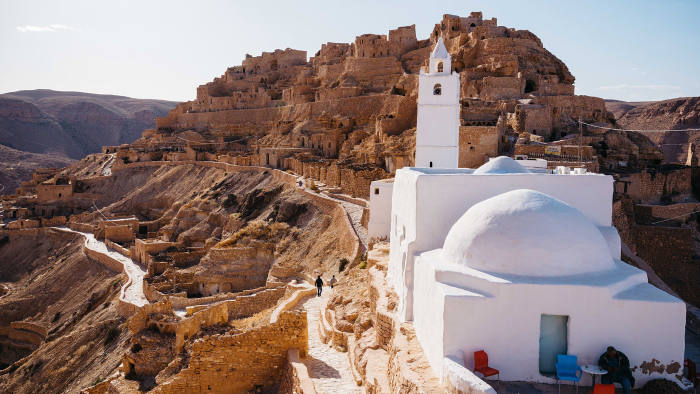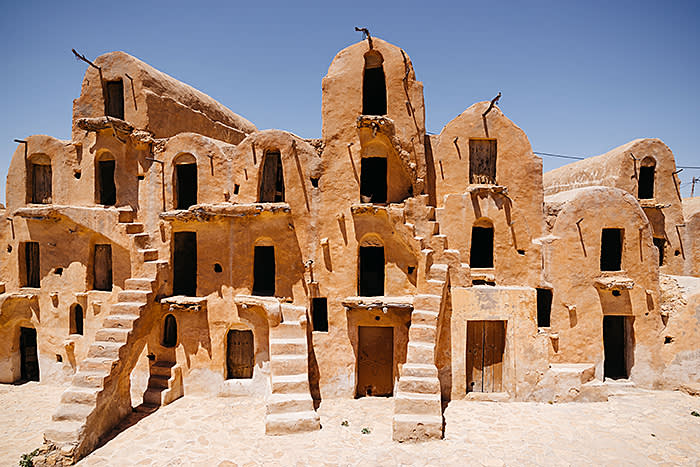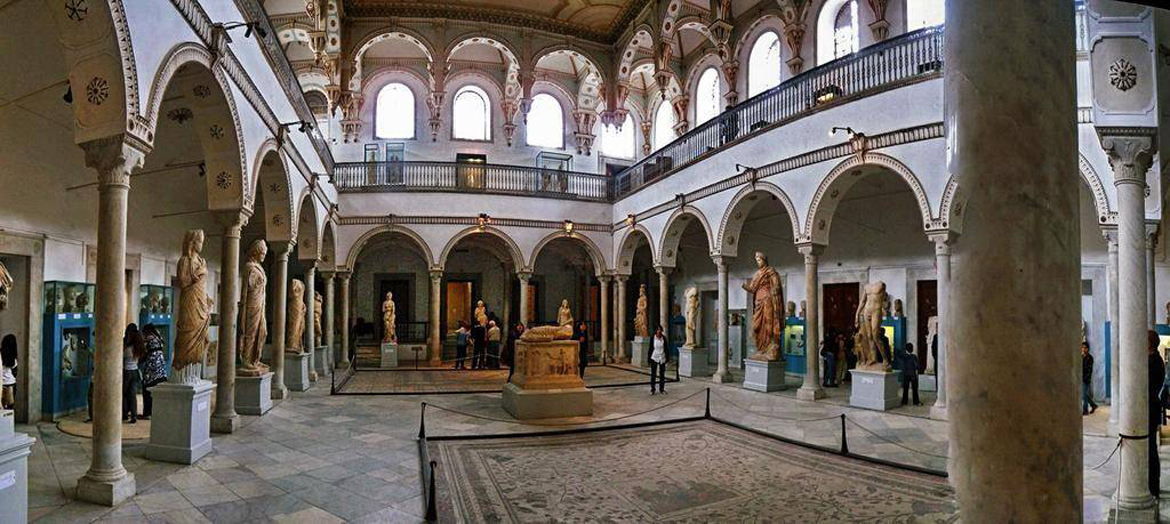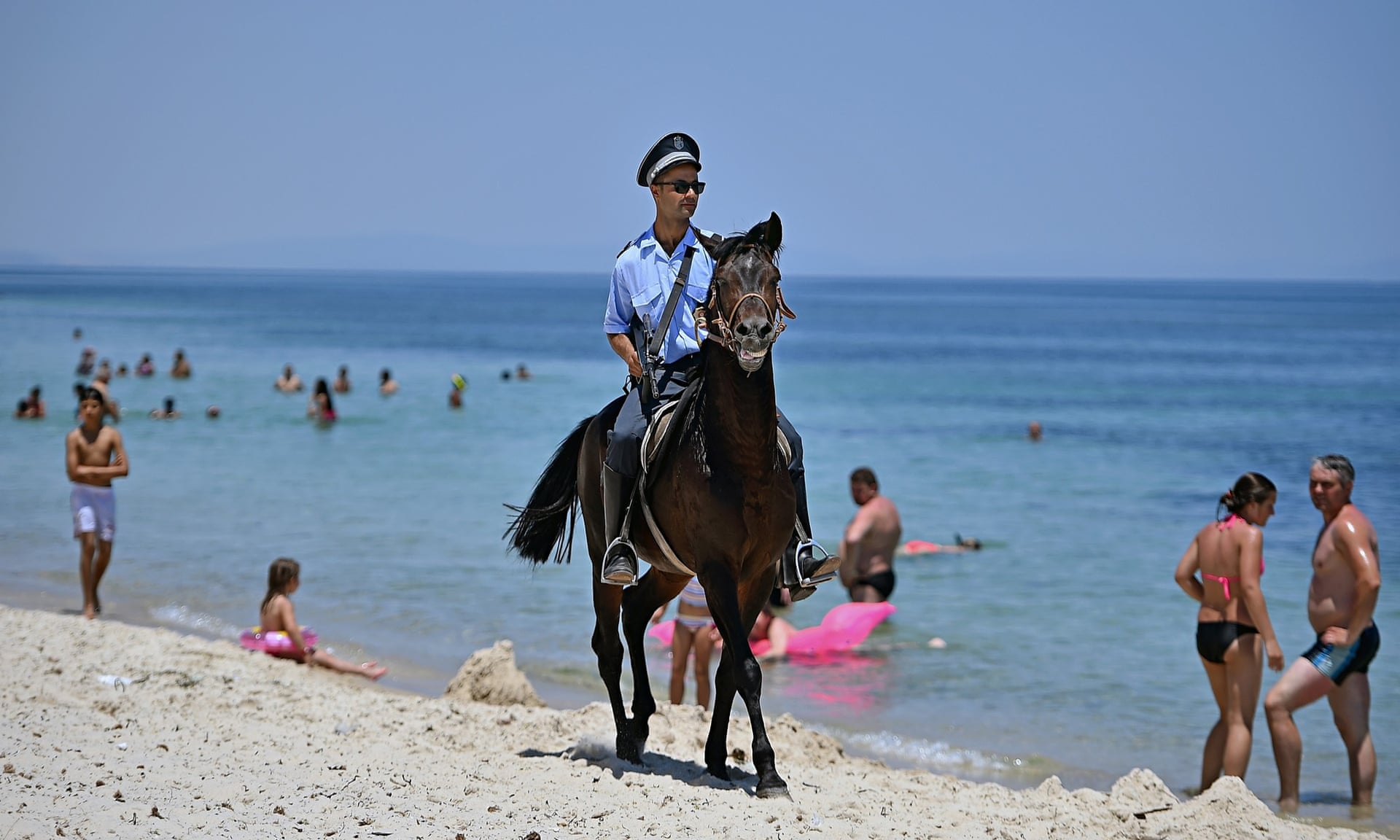It’s a lot more complex that this but the new aspects of the Tourism industry in Tunisia are a government that manages in an assertive and focused way based on their needs rather than just opening the shop door and waiting. The Tunisians seem to know what they have and what they want – others are more passive. They want jobs and a better mix of mass/cheap tourism and high value added tourism.
1. Coast tourism is doing well. Overall tourism is up 50% over last year.
2. Off the coast route there are many fewer tourists that before 2011.
3. In off the track locations there are sites of interests to Jews and these have been developed well including supporting religious festivals, attract large numbers, and spread the money.
4. In the south there are now few tourists so the government is focusing on attracting many more. The landscape is spectacular and with potential:

Chenni.
5. Some tourists, including high spend tourists, are interested in traditional villages and traditional architecture and this is being promoted in Tunisia but bulldozed in Egypt.
This is a Berber grain store:

Their design stimulated the set designer in Star Wars
The Financial times of London loves the trip although conditions are basic but not a bother to them. The words he uses are ‘inspired and reassured’ and he has not one bad word to say. What he has experienced is boutique tourism for the informed and inquiring, tens of thousands of whom, each earning Stg300.000 will read his well written article.
My points. The Financial times hates Egypt. No serious newspaper/magazine with an upper middle class readership has done much, or not much positive, on Egypt. Third what is generally written is targeted at mass cheap tourism or conventional organized groups with double incontinence and a desire to stay on the straight and narrow – 3 stops. There is no activity in the 70,000 staff Ministry of Tourism to attract very small groups of very well off people with an inquiring mind let alone to stimulate small scale specialist tour companies run by young informed people who can cook.
Its like all centrally planned military economies – only big things for big people. In my view using one sledgehammer instead of 1.000 tweezers.
Conde Nast also ranks Tunisia https://www.cntraveler.com/story/travel ... s-we-trust. Bloomberg does also but ignores Egypt. https://www.bloomberg.com/news/features ... go-in-2018. The Independent thinks its good but not Egypt. https://www.independent.co.uk/travel/ne ... 47736.html
Related points. Tunisia has done well with its Greek and Roman ruins - particularly Carthage. Egypt has done very poorly and the sites in Alex are a mess. The Tunisian sites are well and attractively designed/surrounded and signs and descriptions are good.
The central museum in Tunis is comprehensive across the span of history and adopts a non-Egyptian approach. It displays only the best or most interesting rather than dumping a truck load into display cases. Its building is beautiful and elegant.
The food is good to very good with strong French influence and good and reasonably priced wine is widely available.
There are few/no touts and general manners deplore harassment.
If you stay well away from the big beach tourist bunkers you will have a much better time.
Accommodation, bar and restaurant prices are generally higher but there is a big supply in the bigger cities of well run 3 ½ to 4 star venues that whilst not cheap are good value, small-medium in size and family run. There are an increasing number of the old palaces/grand houses run as hotels and not expensive - more of this in Tunis at this stage. Marsa, Sidi Bou Said and Carthage on the city outskirts looks almost like a Greek Island village and is more expensive but very low rise and on the sea.
Towns are generally much cleaner than Egypt and in the larger towns all 19th century buildings have been preserved. Public gardens and trees in streets are dramatically different, and better, than Egypt.
Tunisia survives without 19 international airports.
Tunisia is more interested in value added or high value tourism rather than hordes of $US50 per day.
Supplementary Points.
Mad Tunisians, who are poorer than Egypt, have no taste and they save old feminine buildings that real military men hate, get rid of manly traffic jams and install fountains in squares that are just a waste of water. Squares are also a danger – people might congregate and demonstrate and you need well established sniper posts in all the buildings so the Brotherhood, after they have been killed, can be blamed for everything.

They like a bit of uniformity and dislike random gross advertising – silly people.

Their archaeological sites are surrounded with simple terracing, no touts and no dust, rocks and vendor booths – what wasted opportunities. Few opportunities for people to stumble

Their museums are elegant and not composed of 5 hectare rooms and 100 foot ceilings so they miss the value of brute force and intimidating size. This is a superb room with only the best on display rather than the Supreme Antiques that just randomly dump a truck load of everything (they are 'promising' 5-7,000 Tut items in the new Gem).

Along with Libya and Algeria they have discovered amazing Roman and Greek objects – whilst Egypt has nearly nothing to show for that 600 years – aren’t Egypt lucky to have destroyed all that perverted art or to have overwhelmed central Alex with beautiful apartment blocks that don’t fall over after 50 years.(Egypt had the Greeks and Romans for 600 years - where are all the mosaics - the other countries in north Africa are full of them)

They even have their museums on the Internet whereas none of Egypt’s museums are which helps Egypt’s national security. http://www.bardomuseum.tn/index.php?opt ... 74&lang=en. Like all sensible national museums, but not Egypt, they cover the full history of their country in one place but no Egyptian needs to know their full history – particularly the last 70 years.
Of course Tunisia has terrorism problems but their security arrangements have a bit more style than fat ambling police or tearing vehicles.
It seems simple, cheap, means police travel in ones which triples their efficiency and means they can move at 30 mph and into areas a motor bike or hugely expensive quad bike couldn’t go. Its police on on a horse on a Tunisian beach. Note the smart and western uniform, the rifle/machine gun in his right hand, polished boots, the cop is not obese and most importantly the horse is very well bred, well looked after and well equipped. Note the end of the tail is clipped and I think the mane manicured back.
A smart police force would neutralize the effect of the intrusion by having some horses that could be patted by kids or adults. If nothing it looks spectacular and builds confidence in security. Someone has a brain in Tunisia and likes and looks after animals. Of course riding a horse on sand requires skill and is much more effeminate than a huge 4 wheel $US25,000 and super masculine, and very loud, quad bike of the Egyptian police.








 Experience is not what happens to you;
Experience is not what happens to you;







